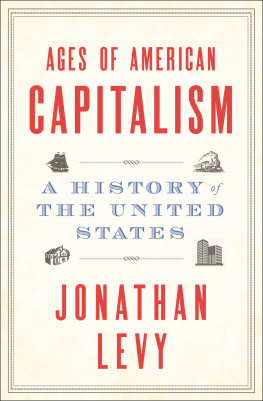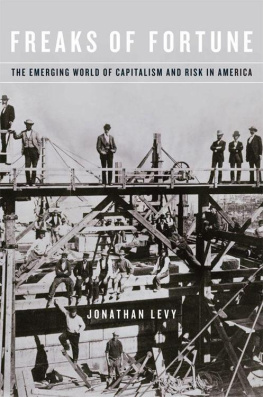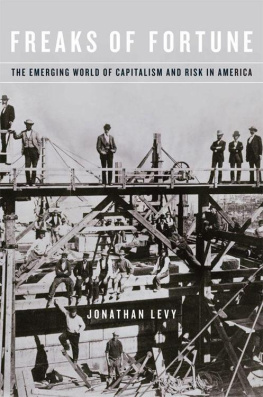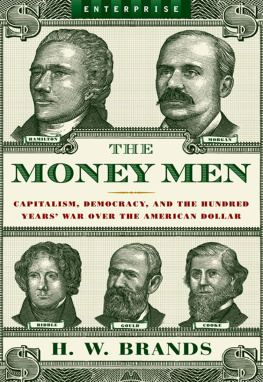Jonathan Levy - Ages of American Capitalism: A History of the United States
Here you can read online Jonathan Levy - Ages of American Capitalism: A History of the United States full text of the book (entire story) in english for free. Download pdf and epub, get meaning, cover and reviews about this ebook. year: 2021, publisher: Random House Publishing Group, genre: Politics. Description of the work, (preface) as well as reviews are available. Best literature library LitArk.com created for fans of good reading and offers a wide selection of genres:
Romance novel
Science fiction
Adventure
Detective
Science
History
Home and family
Prose
Art
Politics
Computer
Non-fiction
Religion
Business
Children
Humor
Choose a favorite category and find really read worthwhile books. Enjoy immersion in the world of imagination, feel the emotions of the characters or learn something new for yourself, make an fascinating discovery.
- Book:Ages of American Capitalism: A History of the United States
- Author:
- Publisher:Random House Publishing Group
- Genre:
- Year:2021
- Rating:4 / 5
- Favourites:Add to favourites
- Your mark:
- 80
- 1
- 2
- 3
- 4
- 5
Ages of American Capitalism: A History of the United States: summary, description and annotation
We offer to read an annotation, description, summary or preface (depends on what the author of the book "Ages of American Capitalism: A History of the United States" wrote himself). If you haven't found the necessary information about the book — write in the comments, we will try to find it.
Jonathan Levy: author's other books
Who wrote Ages of American Capitalism: A History of the United States? Find out the surname, the name of the author of the book and a list of all author's works by series.
Ages of American Capitalism: A History of the United States — read online for free the complete book (whole text) full work
Below is the text of the book, divided by pages. System saving the place of the last page read, allows you to conveniently read the book "Ages of American Capitalism: A History of the United States" online for free, without having to search again every time where you left off. Put a bookmark, and you can go to the page where you finished reading at any time.
Font size:
Interval:
Bookmark:
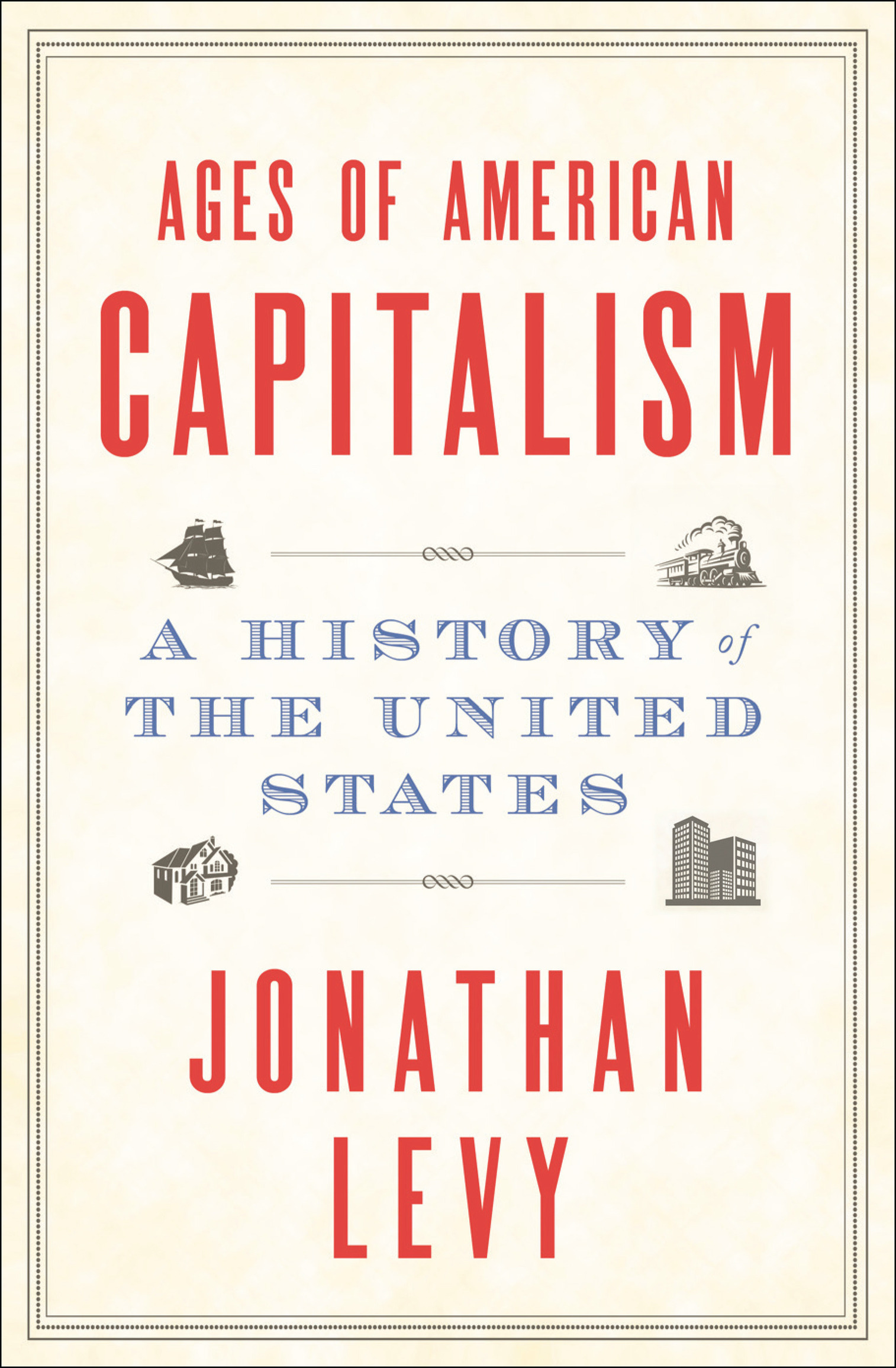
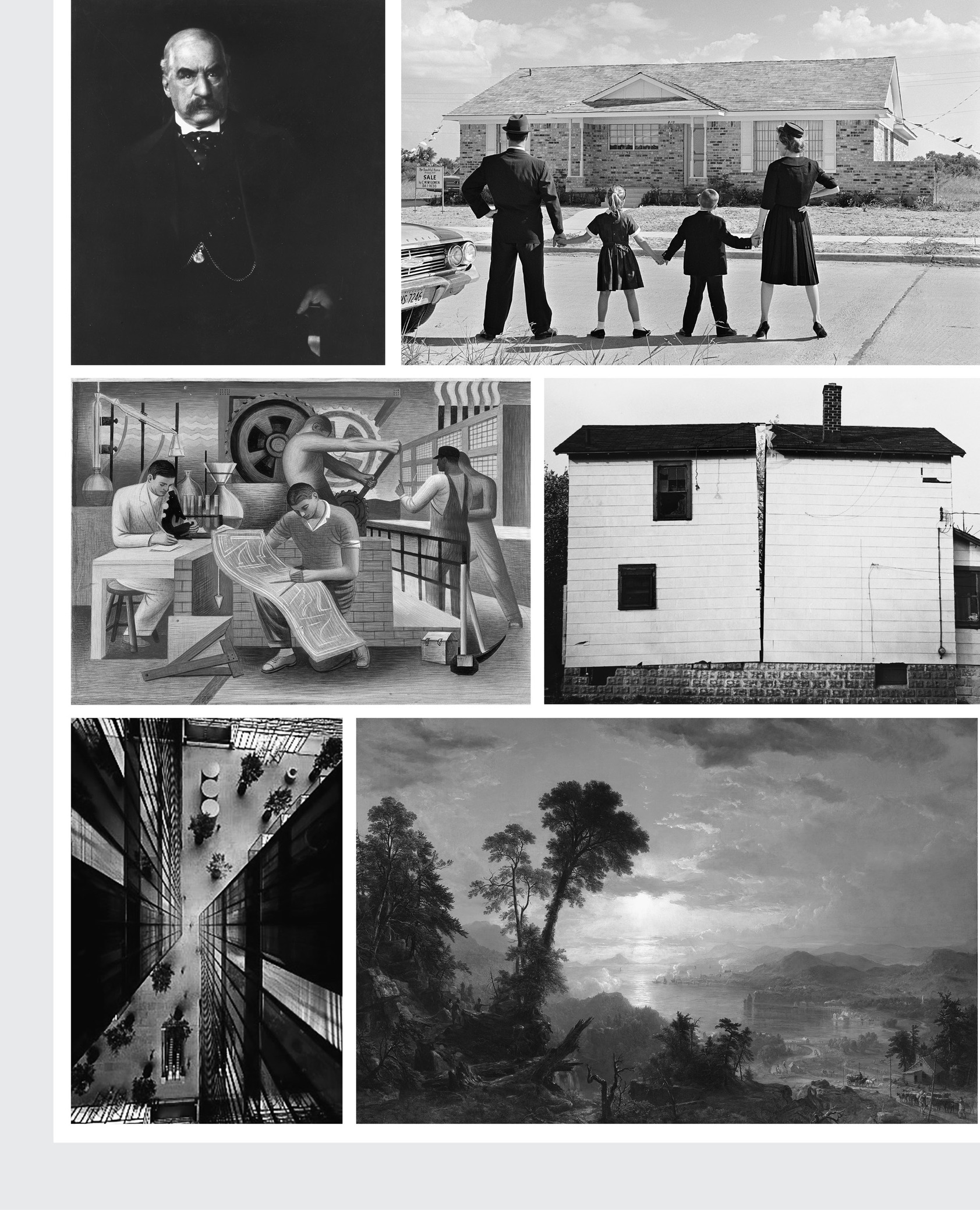
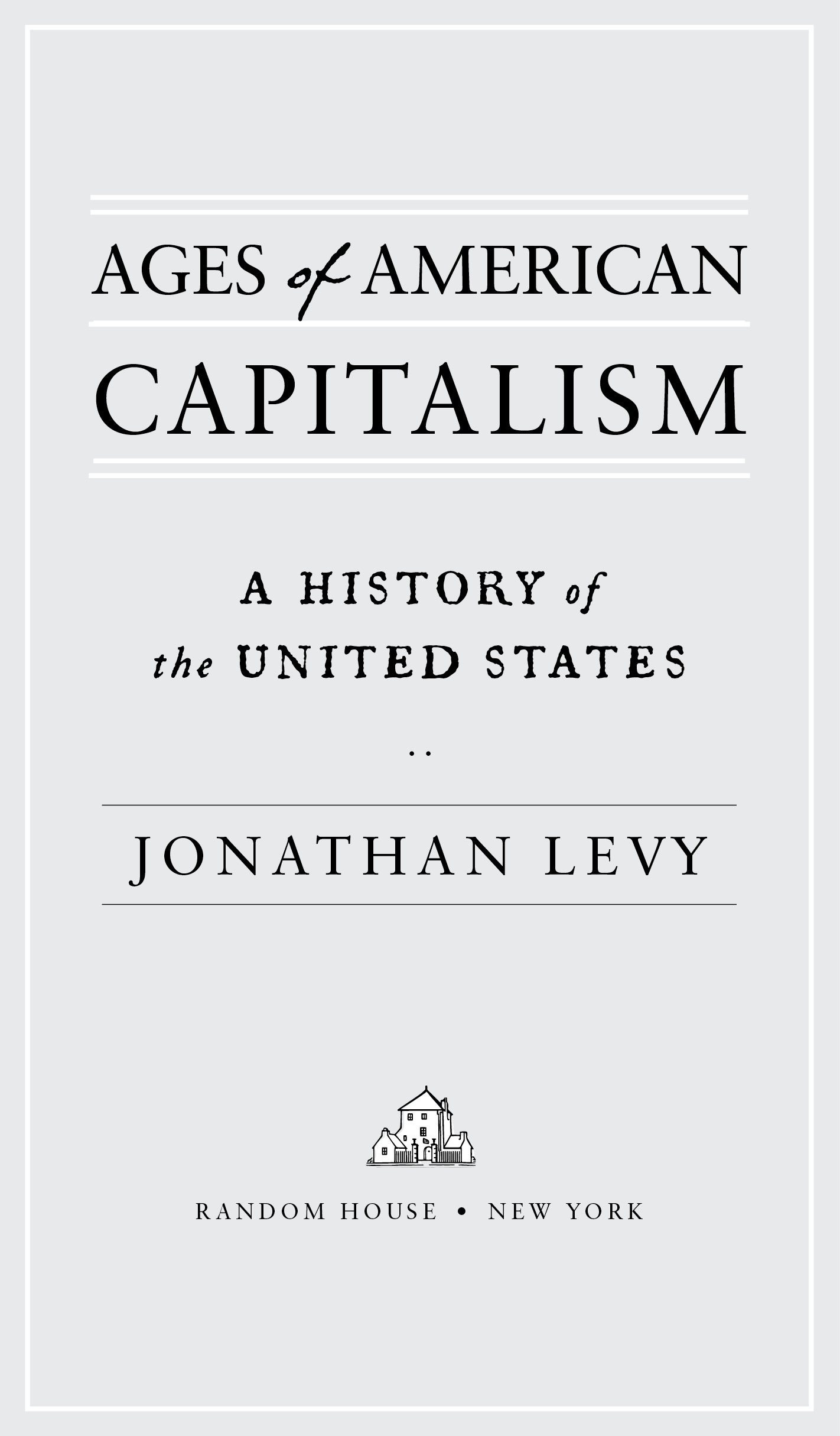
Copyright 2021 by Jonathan Levy
All maps and graphs copyright 2021 by Mapping Specialists, Ltd
All rights reserved.
Published in the United States by Random House, an imprint and division of Penguin Random House LLC, New York.
Random House and the House colophon are registered trademarks of Penguin Random House LLC.
Grateful acknowledgment is made to Yale University Press for permission to use the following maps: Figures 12, 40, 59, and 63 from The Shaping of America: A Geographical Perspective on 500 Years of History: Volume 1, Atlantic America, 14921800 by D. W. Meinig, copyright 1986 by Yale University; Figures 39, 40, 46, and 77 from The Shaping of America: A Geographical Perspective on 500 Years of History: Volume 2, Continental America, 18001867 by D. W. Meinig, copyright 1993 by Yale University; and, figures 46, 48, and 51 from The Shaping of America: A Geographical Perspective on 500 Years of History: Volume 3, Transcontinental America, 18501915 by D. W. Meinig, copyright 1999 by Yale University. Used by permission of Yale University Press.
Additional illustration credits are located on .
ISBN9780812995015
Ebook ISBN9780812995022
randomhousebooks.com
Book design by Barbara M. Bachman, adapted for ebook
Cover design: Wes Youssi/M80 Design
Cover illustrations: Shutterstock
ep_prh_5.6.1_c0_r0
A ny historian can tell you that origins are a very tricky subject. One beginning only reveals another. Still, I know the proximate origin for the writing of this book.
More than ten years ago I was walking in Princeton, New Jersey. It was Monday, September 15, 2008. The next day I was to make the short trip to New York City to meet a friend who worked on Wall Street for lunch.
But I received a message from my friend that obviously he would not be able to meet on Tuesday, given what was happening. What was happening? I had not been following the news. I had arrived at Princeton University one month before, a greenhorn assistant professor struggling to finish my doctoral dissertation. How lucky I was to be recently hired. The academic job market was about to collapse, too. So focused on completing my dissertation in order to keep my job, I was unaware that my chosen academic subjectcapitalismwas then imploding in the most spectacular fashion. For on Monday, September 15, 2008, the New York investment bank Lehman Brothers declared bankruptcy. Fearful and panicked, bankers almost completely ceased trading with one another. Seizing up, the global financial system very nearly crashed. U.S. Treasury secretary Hank Paulson dry-heaved into an office trash can. The Great Recession had begun.
I finished my dissertation. In the spring of 2009, there were bank stress tests, and the panic finally subsided. I taught a class on the history of American capitalism to a small group of enthusiastic undergraduates who were disappointed when the class ended not long after World War II, about as far as the existing historical literature was then able to take us. The students wanted to know the whole story, how it all fit together. I did, too.
Since then I published my first book, a history of risk and finance in the nineteenth century. I kept teaching the class, eventually at the University of Chicago, where I earned my PhD, and where I am now currently employed. Every time I taught it, the endpoint of the class moved closer to the present, as 2008 moved further into the distance. I tried to tackle the whole story, how it all fit together. I wrote this book. Then, just as I finished it in 2020, the economy took another deep dive.
Writing this book has been an education. Since 2008, in the academic circles in which I travel, there has been talk of a new history of capitalism. Whether I like the label or not, I am considered one of its practitioners. While much of this new scholarship is excellent, in my opinion what has been missing in it has been an engagement with economics. To write this book, I have learned and drawn from a tradition of thought in economics, sustained in the twentieth century by such thinkers as John Maynard Keynes, Thorstein Veblen, Joseph Schumpeter, John Hicks, Nicholas Kaldor, and Albert Hirschman. I have also drawn from the pre-twentieth-century, so-called classical political economists that many of them engaged with, above all Adam Smith but also Karl Marx. Learning from these writers, I worked to develop the economic framework that I have employed in this book.
Every single one of these individuals is dead, almost all for quite some time. Why go back to these men, all prominent in their day, but so long departedtheir ideas so long dated? After all, over the years since, economics has made remarkable intellectual progress. But this progress has been in a particular direction, cutting a path of inquiry narrower than the one that economists once carved out for themselves. Today mainstream economics follows a path of great mathematical rigor that, precisely due to this virtue, does not make much room for other accounts of economic lifeincluding historical accounts. I have attempted to make a place for economics in the study of history. That includes contemporary economics and its offshoot discipline of economic history, an essential body of scholarship without which this book could not have been written. But I would argue for the rightful place of historical analysis in economics, and for a broader vision of what the economy is. Dormant traditions in economic thought once argued for this position. Seeking to revive them, I have tried to recut a wider path in order to make room for the inclusion of many subjectsspanning, say, politics and society, or environment and psychethat once were but today are not typically seen as relevant to understanding the economy in which we live. My conviction is that these subjects and many others are relevant. The need to include them is my excuse for having written such a long book.
Therefore, in addition to an economic history, this book can be read as a new single-volume history of the United States. It is a chronicle of American economic life from the English colonial settlement of North America in the seventeenth century through the Great Recession. It is divided into four Ages of American Capitalism: Book One, The Age of Commerce (16601860); Book Two, The Age of Capital (18601932); Book Three, The Age of Control (19321980); and Book Four, The Age of Chaos (1980).
As the United States is often rightly taken to be the quintessential capitalist society, an economic perspective does afford a unique purchase upon its history. A history of the U.S. economy must encompass a great deal: demographic trends, trade patterns, growth rates, energy regimes, incentives, and productivity measurements. But it must also encompass Thomas Jeffersons disdain for the English. Henry David Thoreaus moral critique of commerce, and Herman Melvilles response. The corruptions of the Lincoln administration. Labor violence. FDRs jokes. The persistence of white supremacy. The twentieth-century architecture of shopping malls. Second-wave feminists critique of marriage. The erotic quality of much stock market speculation. Reagans optimism about markets. Obamas ambivalence about bankers. And much more, in the pages ahead.
Font size:
Interval:
Bookmark:
Similar books «Ages of American Capitalism: A History of the United States»
Look at similar books to Ages of American Capitalism: A History of the United States. We have selected literature similar in name and meaning in the hope of providing readers with more options to find new, interesting, not yet read works.
Discussion, reviews of the book Ages of American Capitalism: A History of the United States and just readers' own opinions. Leave your comments, write what you think about the work, its meaning or the main characters. Specify what exactly you liked and what you didn't like, and why you think so.

